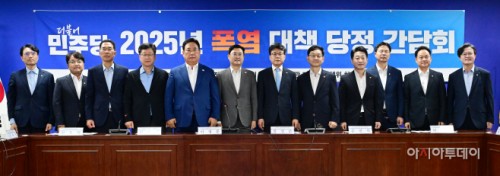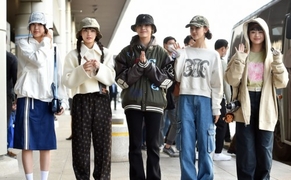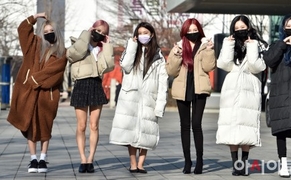 |
| Officials including Democratic Party policy chief Jin Sung-joon (center right) and Vice Minister Yoon Chang-ryeol of the Office for Government Policy Coordination attend a joint policy meeting on heatwave measures at the National Assembly on July 14. / Photo by Byeonghwa Lee |
The government and the Democratic Party of Korea announced a joint set of countermeasures on July 15 to address the ongoing heatwave, including plans to ease the progressive electricity pricing system for July and August to reduce cooling costs for households.
At a policy meeting held at the National Assembly, officials from relevant ministries and Democratic Party lawmakers discussed strategies for summer power supply management, industrial safety, and agricultural protections.
Rep. Kim Won-i, a member of the National Assembly’s Trade, Industry, Energy, SMEs and Startups Committee, noted, “We’re facing what could be the most intense heatwave on record. Power demand already reached 95.7 gigawatts on July 8 — the second highest in history — and we anticipate it could peak at 97.8 gigawatts this summer.”
To ensure stable energy access, authorities pledged to secure sufficient electricity supply and avoid disruptions for the public during peak heat periods.
A key measure will be a temporary adjustment to the tiered electricity billing system. The first tier, which currently applies to usage between 0–200 kWh, will be expanded to 0–300 kWh, while the second tier will shift from 200–400 kWh to 300–450 kWh. This is expected to help households manage cooling expenses more effectively.
Rep. Chae Hyun-il of the Public Administration and Security Committee reported that although the national heat advisory was lifted due to torrential rains beginning July 13, the number of heat-related illnesses has surged. “As of July 13, there were 157 heatstroke cases, including nine deaths — a 2.9-fold increase from last year,” he said. Chae added that the government will monitor the implementation of heat response measures and conduct on-site inspections of designated cooling shelters to minimize public inconvenience.
Rep. Kim Joo-young, Democratic Party secretary on the Environment and Labor Committee, said, “The government plans to activate field-based safety response teams targeting high-risk sectors such as construction, shipbuilding, and logistics. These teams will help enforce five key heat safety rules and conduct unannounced inspections.”
He added that migrant workers in sectors like delivery and courier services, often vulnerable to extreme heat, will also be included in response efforts in cooperation with local governments.
Rep. Lee Jung-moon, senior deputy policy chief, highlighted agricultural protections, stating, “We will actively assess and implement countermeasures to protect farmers, crops, and livestock vulnerable to climate stress.”
Most Read
-
1
-
2
-
3
-
4
-
5
-
6
-
7





















